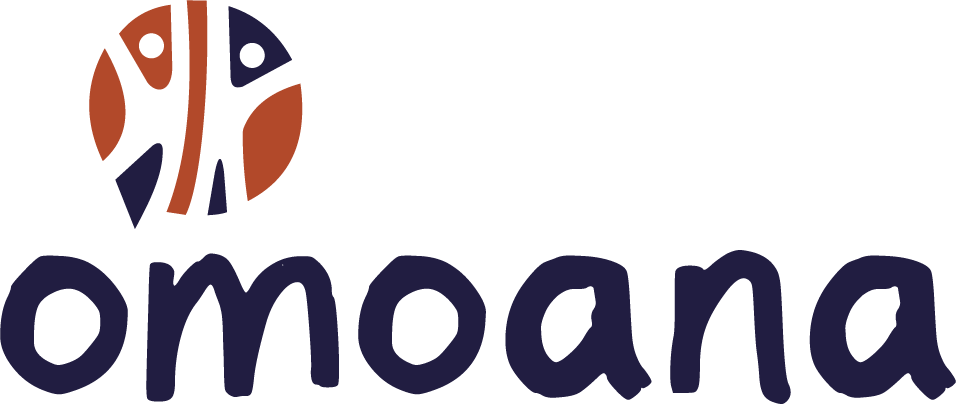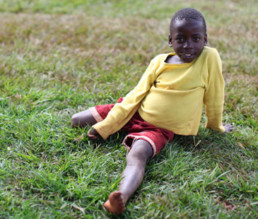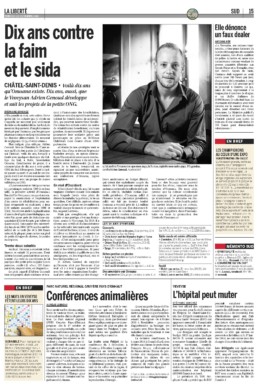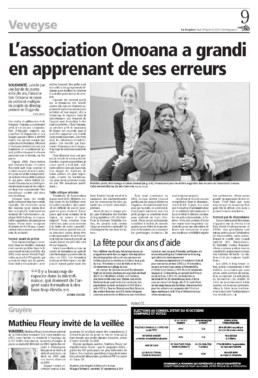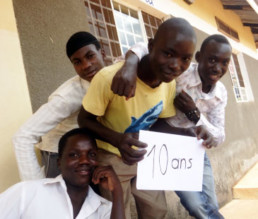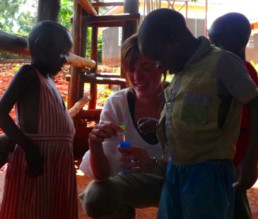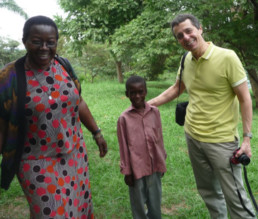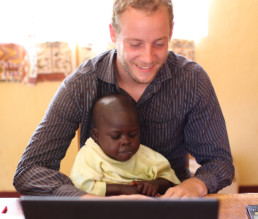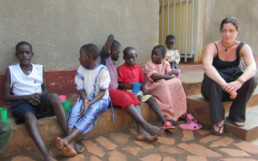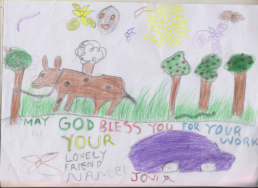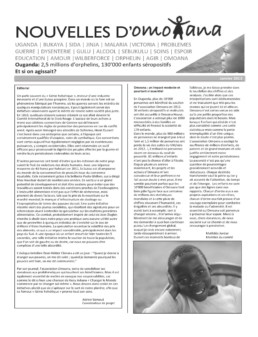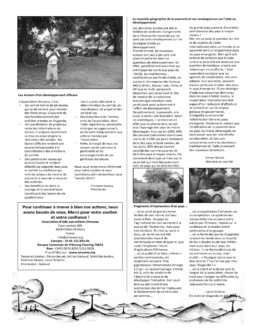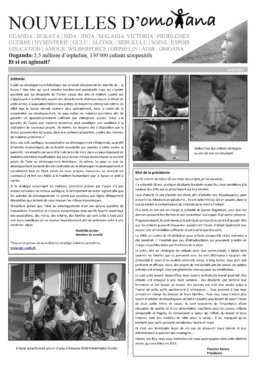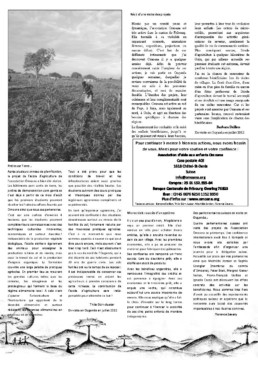Speech by Mathilde Jordan
It is now 10 years since the first lines of the Omoana adventure were written. Initially focused on supporting the St Moses temporary reception centre, the association has continued to evolve. When the necessary knowledge and funds were acquired, Omoana expanded its scope of action. Projects in the fields of health, microfinance, agriculture and education have since been launched.
I believe that it is a feeling of shared humanity that encourages the various players at Omoana to commit themselves to greater justice. It is the conviction that people from elsewhere, whatever their culture, have the same needs, the same aspirations and the same feelings as we who were born in more generous latitudes.
For it was only the chance of birth that gave me the chance to be born in a peaceful country and to study, to have the opportunity to give my opinion regularly as a citizen and to know that tomorrow I will certainly be able to offer these same hopes to my own children. But knowing that others haven’t received the same gifts for their future somewhat tarnishes this pretty picture and does nothing to soothe my spoilt child conscience. Life is not to be taken lightly, and the lives of others even less so. It was certainly with this in mind that, 10 years ago, the founders of Omoana summoned up all their courage and set up the association.
However, despite Omoana’s successes, all too often, when the subject of development aid is raised with acquaintances, I sense a certain weariness among the people I talk to. They’ve heard of wells built in Africa that have been abandoned, they’re put off by the corruption of governments and other bodies, and the excessive administrative costs of some NGOs have considerably undermined their confidence. Apart from these aspects, I often have the feeling of being considered an idealist, a naive person who still believes in vain in these notions of justice and solidarity. In response to this, I would say that it is essential to assert one’s idealistic nature, because it is the source of commitment and indignation. But I would also say that, while I don’t really believe in global change, I do subscribe to the idea that targeted, effective and sustainable development aid does exist, and that the improvements attributable to it are real.
Because when given the means to do so, the beneficiary communities know how to demonstrate responsibility and investment that compel admiration. They are actors in development, and we must give them the opportunity to achieve the financial sustainability that will enable them to offer the prospect of a promising future to their unborn children. Omoana achieves this through innovative projects that are close to local realities. We are convinced that the keys to responsible development lie in enabling local people to become independent and in working with local organisations that know the context better than anyone else.
However, in order to achieve our objectives, we have needed the support of a great many people since the association was founded. I would therefore like to thank the many individual donors and sponsors. Without your trust and generosity, none of our projects would have been possible. A special thank you to Fribourg Solidaire, because beyond the financial support provided, the sound advice of these experts in development aid is invaluable to us. Likewise, the members of our support committee are essential referees. We are particularly grateful to Ilsemarie Cottier, Maria Rivas and Bernard Préel, as well as Jean Genoud, who give so freely of their experience and time. In this anniversary year, our 10-year activities have been made possible thanks to the support of many organisations. Our thanks go to them, and in particular to Fribourg Solidaire and the municipalities of Bulle and Châtel-St-Denis. The management of the Tour de Trême and Bulle secondary schools and the Collège du Sud have supported Omoana’s efforts for many years and are always ready to open the doors of their establishments to us. Thank you from the bottom of our hearts for giving us these opportunities. A sincere thank you also to all the volunteers who have made themselves available on past and future evenings, and to the speakers at the round table to follow. Their experience in the field and their academic knowledge will enrich the evening. And finally, to ensure that the donations and trust of so many people are put to good use, the Omoana committee is working hand in hand with its local partners. Thank you to each of them, here and in Uganda, for generously giving many hours of their time to coordinate, finance and monitor each of the projects. Special thanks go to Florence Savary, Adrien Genoud and Ruth Lubega, the coordinator of Omoana House, who has come to us especially from Uganda.
10 years is just the dawn of a lifetime. We hope that the seeds planted so far will bear fruit for years to come. Let’s not forget that in our gentle country, every citizen has the opportunity, through outrage, commitment and demands, to express his or her opinions. These are vitally important because they can influence North-South relations, and thus the lives of people elsewhere, who are proving every day, by their strength and involvement, just how much they too want to achieve dignity.
10 years of commitment
In 2013, Omoana celebrates its tenth anniversary. Various events are being organised to mark the occasion:
– Photo exhibition
– Concerts
– Support dinner
– Official Omoana tenth anniversary party
– Card game
– Raising awareness about child soldiers and food security
Omoana is celebrating its tenth anniversary in 2013. Various events are being organised to mark the occasion:
– Exhibition of photographs retracing Omoana’s 10 years of activities
26 August – 19 September at Services Industriels Genevois
21 September – 3 October at the CO of La Tour-de-Trême
4 October – 19 October at the Bulle OC 9 – 20 December at the Collège du Sud in Bulle
———————————
– Armaillis de la Gruyère concert
21 September, 8.15pm, salle CO2, La Tour de Trême, no reservation necessary, collection at the door
———————————
– Concert: “The Memphis Night” and “Todos Destinos
27 September, from 9pm, Ebullition, Bulle, 20.00chf
———————————
– Support dinner in Geneva
28 September, salle paroissiale St-Pie X, Ch. du Coin-de-Terre 2, 1219 Châtelaine
6pm: screening of the documentary about the association,
7pm: aperitif,
7.30pm: meal Price: 50.00/pers.
Registration form to be sent to sophie-gr@hotmail.com
———————————
– Official Omoana tenth anniversary evening
Round table “Fundamental rights: what access to health do people in the South have?” 2 October, 6.30pm, salle CO2, Bulle
Speakers:
Paul Grossrieder, former Director General of the International Committee of the Red Cross (ICRC)
Prof. Doris Schopper, former President of Médecins Sans Frontières and Director of the Centre for Study and Research in Humanitarian Action (CERAH)
Prof. Jean-Jacques Friboulet, Professor of Political Economy at the University of Fribourg, specialist in development.
Moderator: Serge Gumy, Deputy Editor-in-Chief, La Liberté.
———————————
– Globull, 2000s evening
25 October, Globull disco, Bulle
———————————
– Card game
15 November, 7.30pm, Univers@lle, Châtel-St-Denis Price: €25/person Registration on site
———————————
– Octuor Vocal de Sion” concert
16 November, 8.15pm, Univers@lle, Châtel-St-Denis, collection at the door
———————————
– Concert by the group “Tyago”, after DJ’s Sam et Kab, Deep House
30 November, from 9pm, Le Buro, Bulle Deep House evening at the Archives Children’s entertainment in the morning, from 9am Exotic lunch, raclette and chalet soup in the evening
———————————
– Raising awareness about child soldiers and food safety
19 September at CO La Tour, 4 October at CO Bulle, 25-28 September at Collège du Sud
———————————
Omoana is also organising a sale of value-for-money wines. You can order them using this form, which also includes a description of the different wines (deadline: 17 November 2013, delivery and payment: December 2013 before Christmas).
Article on Omoana’s 10th anniversary published in La Liberté on 20 September: Ten years against hunger and AIDS
Ensuring a shared, sustainable and mutually supportive future
Usually, we prefer to look to the future to help make it a place of hope for every Ugandan child. Today, however, on the eve of our 10th anniversary, it seems essential to retrace our steps and try to understand the evolution of the Omoana adventure.
In the beginning, it would be wrong not to mention the perseverance of the founders, who, thanks to their mobilisation efforts and deep convictions, were able to sow the seeds necessary for the various “Omoana” projects to blossom. The generosity and confidence of many volunteers and donors have since helped to make this fertile ground fertile, so that the efforts of the beginnings can bear fruit and the activities on the ground can continue.
Today, Omoana may no longer have the spontaneous and somewhat innocent colours of its beginnings, but it nevertheless retains a young and dynamic spirit. Over time, this has been complemented by experience in the field, professionalism and knowledge of the context, made possible by fruitful exchanges with Ugandan partners. We believe it is essential that the projects set up respond to local needs and demands, taking into account the individuality and history of the beneficiaries. The projects must also respond to the current challenges of development aid and aim to empower the beneficiaries and make them independent.
It is precisely in the name of the experience accumulated over 10 years that we wish to organise the various events to come. They are intended to be festive, but also informative, because we will never cease to encourage young and old alike to commit themselves to the path of solidarity, in order to ensure a prosperous, sustainable and just future for every inhabitant of this Earth…
Mathilde Jordan
Testimonial: Omoana celebrates its 10th anniversary
I discovered Omoana when I attended the 126th Assembly of the Inter-Parliamentary Union (IPU) in Kampala from 31 March to 5 April 2012. Created in 1889, the IPU is the international organisation of national parliaments, a kind of UN of parliaments. It works for peace and cooperation between peoples and the strengthening of representative democracy.
Our delegation, accompanied by Swiss ambassador Jacques Pitteloud, visited Omoana, whose existence had been brought to our attention in Switzerland. Mathilde Jordan gave us a warm welcome, showed us around the organisation and explained how it works. We shared lunch with the staff in a festive atmosphere, topped off by songs from the children. We then all went back up to the source of the Nile and shared moments of peace and happiness. I still remember the look in the children’s eyes: I saw a mixture of fear and joy. I saw hope for a better future.
And it’s all thanks to Omoana, which is celebrating its 10th anniversary today. I have a great deal of respect for these students from Fribourg who, in 2003, had the courage to launch this venture and provide an answer to questions that were troubling their consciences. As a liberal, I congratulate them! They took the initiative without waiting for “the State to do it”. They have taken the initiative in accordance with the values of freedom and responsibility that I hold dear. I hope that Omoana will continue its efforts along the same path with passion and courage: a lot has been done, but even more remains to be done!
Ignazio Cassis, doctor
National Councillor, TI
Member of the support committee
Together with the children
Since the beginning of Omoana’s activities in Uganda, I have come across many stories of children, men and women whose strength, hope and suffering have left their mark on me. Whether they are actors in or beneficiaries of Omoana’s work, they have brought to life a commitment that goes beyond fundraising and day-to-day activities, and remains above all human.
Omoana’s beneficiaries include young people, orphans, HIV-positive people and former child soldiers. On many occasions, I have seen their astonished looks at so much suffering. But I was also often surprised by the resources they found within themselves to face up to adversity. Incredible faith in the future enabled our first beneficiary, an orphan and victim of rape in her family, to become a primary school teacher and pass on her knowledge with dynamism and gaiety. I am also thinking of the perseverance of a former child soldier and a teenager who, at a certain stage, was suffering from tuberculosis, meningitis, severe malnutrition and stage 4 AIDS. Both are currently studying and will be joining university in one or two years’ time. These children inspire us. But this is just the beginning. When asked what they want to be, most of them want to become doctors. They will undoubtedly make their contribution to the development of their country, and to humanity as a whole. Who says we don’t have a future Nelson Mandela among our beneficiaries?
Some of these children have not had the opportunity to show the world what they are worth. I can’t help but think fondly of them. They often died in atrocious suffering, which speeches about justice and equal rights cannot describe. I like to think that they have become angels who help us to fight for the rights of their brothers and sisters. But when we remember their deaths, a certain resentment never goes away, the resentment of knowing that today no one should have to die of AIDS or malnutrition. It is negligence above all, at both global and local level, that means these children are leaving us like this. I’m also overcome with sadness, because I can’t forget the screams of grief of their relatives at the sight of the lifeless bodies of these young people.
The efforts of Omoana, its committee, its partners and donors, and the children’s families remain essential to offering them prospects for a sustainable future. Among the 2.7 million orphans, the 130,000 HIV-positive children and the 25,000 former child soldiers in Uganda, there are above all human souls, far more than statistics. Many injustices are taking place, admittedly in faraway lands thousands of kilometres away. But they are happening now, at a time when we are all potentially agents of change. That makes us responsible for making this Earth a place where living doesn’t have to be a privilege. The stories mentioned in this article bear witness to the fact that in this world anything is possible. Fatou Diome wrote “In the scales of globalisation, the head of a child from the Third World weighs less than a hamburger”. It is up to us to change this state of affairs. A sincere thank you to all those involved in Omoana’s work who, through their support, are not giving in to fatalism.
Adrien Genoud
Looking back over ten years of solidarity
It’s been ten years since the adventure began… And I remember the first committee meetings, the definition of Omoana’s objectives and, above all, our eyes filled with a strange mixture of hope and apprehension. Because even as young people, driven by our many ideals, we knew that the task would be arduous, the obstacles numerous and the disappointments inevitable. We were aware that the responsibilities we now bore were great. Because from then on, the success or failure of the missions we accepted would influence at least some of our destinies. At the time, we had no idea that our labours would affect more than seventeen thousand souls a decade later. How could we even imagine that, even with our wildest ambitions?
The years have passed. We have retained from our youth the determination and faith in our ability to alleviate the misery we witnessed. To this essential baggage, we have added the know-how that comes from experience in the field, often painful, sometimes comforting. We then developed various projects with the constant concern not to fall into the potential pitfalls of humanitarian aid. Despite its fine intentions, humanitarian aid is all too often perverted by misery and counterproductive charity. The fear of creating dependency on our support has been constant. Every decision we have taken has been part of a long-term commitment. These are some of the undeniable qualities of the steps taken by the Omoana association. Rather than making people dependent on aid from NGOs or the international community, our aim is to encourage beneficiaries to become self-reliant so that they can take their destiny into their own hands. They should be able to look after their children and contribute to the development of their country themselves. Instead of giving fish to those who need it, let them have the opportunity to learn to fish and buy a net!
Encouraged by the visible impact of our activities in the communities, we gradually diversified our projects. And the unspeakable suffering we have witnessed has only strengthened our resolve to give more time and more effort to the association. Although it’s not just about money, our voluntary work is essentially about fundraising. Involvement in Omoana is more of an administrative task: developing projects, drawing up budgets and taking responsibility for them by seeking support. Then, making sure that the funds raised are used exclusively to achieve the goals set. The association’s committee quickly realised that its tasks were far removed from “humanitarian trips”, which are sometimes linked to the exotic pleasures of tourism.
Finally, I’d like to highlight the incredible personality of the founder of the Omoana association. Adrien, your perseverance, your boundless energy and your refusal to see injustice as inevitable have made this crazy adventure possible. Your will, your audacity and your confidence make it possible to lift mountains. And, of course, the courage of the beneficiaries in Uganda. On behalf of all those who, from near or far, have contributed to the activities of the Omoana association, we thank you for the surge of solidarity you created 10 years ago, and our Ugandan friends for their determination to live rather than suffer and die.
Florence Savary
